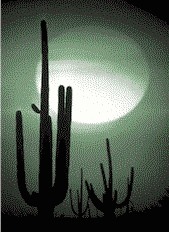On Halloween
By A. Idris Palmer
Halloween is a Western celebration originated by Celtic pagans and traditionally applied to the evening of October 31. It is completely based on rituals involving dead spirits and devil worship. Moreover, it symbolizes the beginning of the ancient Druid new year, who hold that the dead revisit their homes at that time, thus in essence, Halloween represents the devil worshipper's New Year's celebration. Mexico, which has a similar celebration at the same time, calls the day, "El Dيa De Los Defuntos" (The Day of the Dead).
Therefore Muslim commemoration of such a day is absolutely haram; as it involves the worst elements of shirk and kufr. Indeed, participation in it is similar to one commemorating Christmas or Easter, or congratulating the Christians upon their prostration to the crucifix. In fact, it is worse than congratulating them for drinking wine, fornication and so on. Muslim parents therefore should advise their children accordingly and not allow them to participate in these celebrations.
Historically, Halloween precedes the Christian feast of Hallowmas, All Hallows, or All Saints' Day. The observances connected with Halloween originated among the ancient Druids, who believed that on that evening, Saman, the lord of the dead, called forth hosts of evil spirits. The Druids customarily lit great fires on Halloween, apparently for the purpose of warding off all these spirits. Among the ancient Celts, Halloween was the last evening of the year and was regarded as a propitious time for examining the portents of the future. The Celts also believed that the spirits of the dead revisited their earthly homes on that evening. After the Romans conquered Britain, they added to Halloween, features of the Roman harvest festival held on November 1 in honor of Pomona, goddess of the fruits of trees.
The Celtic tradition of lighting fires on Halloween survived until modern times in Scotland and Wales, and the concept of ghosts and witches is still common to all Halloween observances. Traces of the Roman harvest festival survive in the custom, prevalent in both the United States and in Great Britain, of playing games involving fruit, such as ducking for apples in a tub of water. Of similar origin is the use of hollowed-out pumpkins carved to resemble grotesque faces and lit by candles placed inside.
How therefore is the Muslim to understand this matter in the light of the shari‘ah? Firstly, the Prophet sallallahu `alayhi wa sallam said in an authentic narration: "Whosoever resembles a people is from them." This is a general statement prohibiting the Muslims from imitation of the kuffar. Any Muslim, who thereby, participates with the non-Muslims in their celebrations, particularly those which involve clear shirk and kufr— is asking for the wrath of Allah and misguidance to descend upon him like it has descended upon them. Allah ta‘ala says: "And those who do not witness falsehood, and if they pass by some evil play or evil talk, they pass by it with dignity." [Al-Furqan, 25:72]
According to the major Companions and their students such as Mujaahid, Rabi‘ ibn Anas and Adh-Dhahhak, the word "falsehood" used in above verse refers to "the holidays of the mushrikeen." Others like Muhammad ibn Sireen are more explicit, stating that the verse defines "the people of shirk practicing their shirk, and (the verse admonishes us) not to participate with them." Thus the believers are those referred to in the verse as "not witnessing falsehood."
At-Tabari explains this aspect, when he says: "It is not allowed for Muslims to attend their [the disbelievers’] holidays and festivals because they are a type of evil and falsehood. If the people of good mix with the people of evil without putting an end to what they are doing, then they become like those who are pleased and influenced by the evil. And we fear falling into Allah's anger because of their gathering." The resemblance referred to here includes all the aforementioned ways. At-Tabari further explains the above mentioned verse, (And those who do not witness falsehood), "They do not assist the people of idolatry in their idolatry, nor do they associate with them."
It was the sunnah of the Prophet sallallahu `alayhi wa sallam to differ from the non-Muslims, particularly in those matters which were specific to non-Muslims. In Sunnan Abi Dawud, Anas ibn Malik says that when the Prophet sallallahu `alayhi wa sallam came to Medinah, there used to be two festivals in which the people engaged in playing sports. So the Prophet asked, "What are these two days?," they replied, "We used to play sports during these in the jahiliyah (time period before Islam)." The Prophet sallallahu `alayhi wa sallam then said, "Verily Allah has given you two better days, the Day of Adha and the Day of Fitr."
This not only shows that the Prophet sallallahu `alayhi wa sallam did not acknowledge these days, but also shows that Allah has dignified the Muslims with days which are pleasing to Him and superior in merit. Indeed, the glorious companions understood this and applied its ruling to the fullest extent. Abdullah ibn ‘Umar said, "One who settles in the lands of the non-Muslims, celebrates their New Year’s Days, and behaves like them until he dies, will be raised with them on the Day of Resurrection."
I pray that this brief response clarifies this issue about the origin of Halloween and the Islamic position on it. And Allah knows best, and to Him is our return. Ameen.
(source: islaam.com)
***
Related read: A Muslim on Halloween by Dr. Hesham Hassaballa, who writes:" I'm no fanatic, but Islam is strictly monotheistic--and, for me, any holiday having to do with worshipping other gods is wrong."
Halloween is upon us, and scores of children dressed up as everything imaginable will soon hit the streets, going door-to-door for candy. This year my five-year-old daughter is old enough to go. Alas, I will not let her. This is not because I am afraid for her safety, or I do not want her to eat her body weight in candy (though these are legitimate concerns). My decision is based on Islamic principles.
Islam accepts the cultural traditions of a people as long as those traditions agree with Islamic values. Thus, blue jeans, baseball caps, hot dogs, and other quintessential American items are wholeheartedly accepted by Islam [...] And this is why I will not send my daughter trick or treating this year or any other year. Halloween honors Celtic and Roman gods. Islam is strictly monotheistic, and anything having to do with the worship of any other god besides the Most Holy One is out of the question.
Many will see this stance as "fanatic," but I take exception to that accusation. I will not parade the streets trying to prevent trick-or-treaters, Muslim or otherwise, from getting their candy. I will not put a sign on my door saying, "No candy here--Halloween is a pagan holiday and you will all burn in hell." My family and I simply will not participate in Halloween festivities."
read the complete article
here
Labels: integration issues, Muslim practices, Muslims around the world, Muslims in the West, what do Muslims think?


















